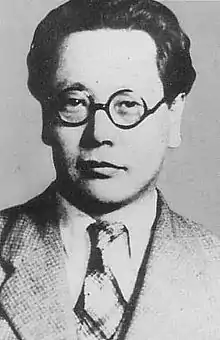Jun Tosaka
Jun Tosaka (Japanese: 戸坂 潤, Hepburn: Tosaka Jun, 27 September 1900 – 9 August 1945)[1] was a Shōwa era Kyoto-trained Japanese intellectual, and teacher. Some identify strands of Marxism in his later philosophy. His criticisms of governments and their war policies caused him to end up in prison on various occasions.[2]
Jun Tosaka | |
|---|---|
| 戸坂 潤 | |
 | |
| Born | 27 September 1900 |
| Died | 9 August 1945 (aged 44) |
| Nationality | |
| Era | 20th-century philosophy |
| Region | Japanese philosophy |
| School |
|
| Academic advisors | Nishida Kitarō |
Main interests | Critique, social criticism, historical materialism, anti-imperialism |
Life
Jun Tosaka was born in Tokyo in 1900. Due to his mother's illness and his father's early death he was moved that same year with his nurse to live with his grandparents in the Ishikawa Prefecture on the western side of the country. In September 1905 he returned to Tokyo where he grew up with his mother in the city's Kanda quarter (today part of Chiyoda).
He attended Kyoto Imperial University. He was interested in the works of Nishida Kitaro, and Tanabe Hajime, neo-Kantianism, and then Marxism. He was a member of the Kyoto School. In 1938, he was arrested under the Peace Preservation Law. He died in Nagano Prison before the end of World War II.[3]
References
- "Tosaka Jun". Kotobanku (in Japanese). Asahi Shinbun. Retrieved 4 February 2015.
- Ken C. Kawashima; Fabian Schaefer; Robert Stolz, eds. (2013). Tosaka Jun: A Critical Reader. ISBN 978-1-933947-88-4. Retrieved 2 June 2019.
{{cite book}}:|work=ignored (help) - William Theodore De Bary (13 April 2005). Sources of Japanese Tradition: Volume 2, 1600 to 2000. Columbia University Press. p. 932.
Further reading
- Ken C. Kawashima; Fabian Schäfer; Robert Stolz (2013). Tosaka Jun: A Critical Reader. Cornell University East Asia Program.
External links
- "MacArthur Ousts High Jap Official, Fires Police Heads". The Daily Times. 3 October 1945.